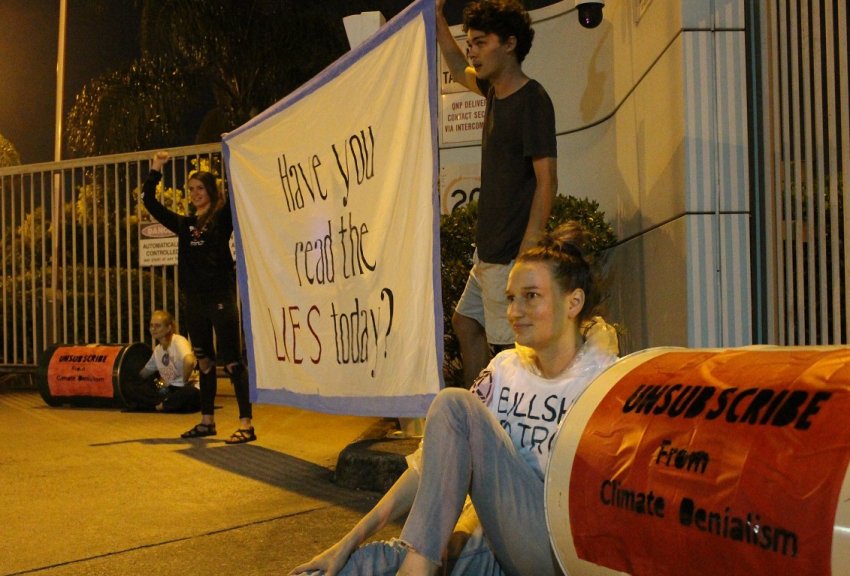
If you walked past a Brisbane newsstand on the morning of February 27, you may have noticed it was a little bare. That’s because three activists were elbow-deep in cement-filled barrels the night before, blockading the exit of News Corp's Murarrie printing press.
The trio, who were reprimanded by police after several hours, were 25-year-old communications manager Justice Cambridge, 22-year-old psychology student Jarrah Kershaw and 18-year-old law and science student Clancy Smith.
Their protest was directed by Extinction Rebellion South East Queensland, which has made headlines over the past year for its chaotic tactics and ensuing mass arrests. It is not the first time the group has thrown the gauntlet at Rupert Murdoch either, having dumped a truckload of manure on News Corp’s doorstep last month.
Their demands are simple: that News Corp tell the truth about the climate and ecological crisis.
Cambridge told Green Left: “Australia has just seen one of its first real glimpses of climate destruction in the past bushfire season and we know that things are going to get much worse.
“Murdoch’s News Corp has made its stand on the climate crisis clear, denying scientific consensus and peddling lies to deliberately confuse readers.
"Extinction Rebellion involves tens of thousands of people across Australia who are ready to take action. We are willing to put our bodies on the line, to break the law, to stop business as usual, until climate action is prioritised over the agendas of lying billionaires.”
When they are not sitting in the Brisbane Watch House or handling huge quantities of dung, these activists are meeting at their local for interviews; mopping their floors and locking their keys in the car; going to work and poring laboriously over assignments.
So what is driving them to take action? For Kershaw, it is a matter of free speech.
“When there's a monopoly on the media, journalists can’t tell the truth,” he told GL. “Corporations like News Corp have unjustified influence over the media and elections. They are subjugating our rights to free speech and the truth. To have a healthy democracy we need the media to be free of corporate or political influence.”
While coordinated strikes and matching T–shirts might not be your cup of tea, the team (self-described as “The Bullshit Patrol”) are not alone.
News Corp drew the ire of many for its coverage of the New Year bushfires, including an employee who described it as an “irresponsible” and “dangerous misinformation campaign”.
The criticism joins a long history of backlash and boycotts for the transnational media company, whose Australian subsidiaries have faced investigation for phone hacking scandals, piracy and even playing a major role in orchestrating the removal of two prime ministers.
This should be a worrying track record for a company accounting for more than 65% of Australia’s capital city and daily newspapers – the most concentrated newspaper ownership of any Western country.
With a reputation in murky dealings (including official investigations in both Britain and the United States spanning years and hundreds of arrests), it is not surprising that News Corp's ethical standing has become a bone of contention among media outlets worldwide. Among these is the New York Times, whose investigation into the company's coverage of the recent bushfires found a “relentless effort to shift blame to the left, protect conservative leaders and divert attention from climate change”.
While scientists stated that the unprecedented fires had burned more of New South Wales than the past 15 years combined, Murdoch-owned broadsheet The Australian regularly ran stories decrying “climate alarmists” and minimising the disaster.
Later, an independent study uncovered a swath of online bots and trolls exaggerating the role of arson in the fires at the same time the paper was running features on the topic. Critics also pointed to the company’s continued platform for self-professed climate change deniers, such as Andrew Bolt and Peter Ridd.
According to Smith, Australia’s current media landscape “looks less like democracy and more like political propaganda”.
“There are clear ties between the fossil fuel industries, political parties, and News Corp,” she told GL. "When the vast majority of our news outlets are blatantly denying or obscuring the truth, it is our duty to demand better. This is us demanding better.”
Smith and her Bullshit Patrol companions are not the only ones outraged. A public boycott of News Corp subsidiaries is underway.
Anti-racism rallies have flooded the streets outside News Corp offices from Sydney to New York. Protesters have stood before, laid on and glued themselves to footpaths outside headquarters to call Murdoch a “climate criminal of the highest order”.
Feminist groups have banded together to run ongoing anti-News Corp campaigns, calling out the company's advertisers for funding misogyny.
Most famously, of course, there was that time the English city of Liverpool banned News Corp publications.
“We’re on a fast track to climate devastation,” said Cambridge. “In a country as uniquely hot and dry as Australia, a free and truthful media is absolutely crucial. If we don't take a stand now, most young people won’t live to see old age.”